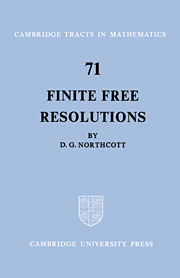Book contents
Summary
General remarks
In Chapter 2, R will always denote non-trivial commutative ring and the main aim of the chapter will be to prepare the way for applications of the theory of matrices to the theory of modules. To this end we shall spend some time on the properties of free modules. From our point of view their importance lies in the fact that every module can be regarded as the cokernel of a homomorphism between two free modules. Of course the connection with the theory of matrices is particularly strong when we are dealing with a homomorphism between two free modules each having a finite base. The cokernel of such a homomorphism is known as finitely presented module and this type of module will receive special attention.
Free modules over a quasi-local ring have an additional interest because of the theorem of I. Kaplansky which says that if R is quasi-local, then any direct summand of a free B-module is itself free. A proof of this result is given in section (2.3). Since localization at a prime ideal always produces a quasi-local ring, there are now obvious advantages in extending the theory of localization so as to include not only R and its ideals, but also R-modules as well.
Free modules
Let E be an R-module and {xi}i ∈ I a family of elements of E. This family is called a base for E if (i) the xi generate E, and (ii) the xi are linearly independent over R.
- Type
- Chapter
- Information
- Finite Free Resolutions , pp. 22 - 52Publisher: Cambridge University PressPrint publication year: 1976



